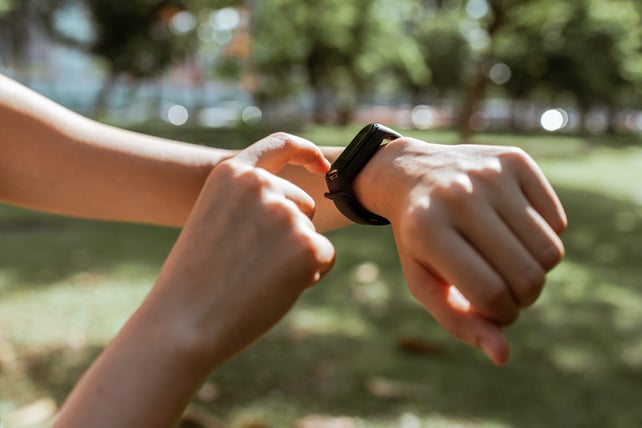
Wearable technology is not just for personal use, it’s poised to become an essential part of healthcare.
In fact, the fitness tracker of today got its start as a healthcare tool to combat obesity. Developed in 1965 by Dr. Yoshiro Hatano, the pedometer was named Manpo-kei, which translates to ’10,000 steps meter’. This is the origin of the 10,000 daily steps goal, a benchmark that continues to persist even today. Although the quantity of daily steps needed for optimal health is far more personal than the generic “10,000”, measuring our daily exercise provides an important view into our risk of chronic disease.
From this beginning, fitness trackers have grown tremendously in popularity in the health and wellness space and have become increasingly sophisticated with more and more individuals monitoring their own health and tracking their activity levels, sleep behaviours, heart rate, etc. In fact, the use of wearable tech has tripled in the past four years and more than 80% of people now consider wearing smart fitness trackers, while the number of smartwatch shipments is projected to rise to 121 million by 2022.
Today, wearable technology can play an important role in healthcare. Practitioners and patients are embracing virtual care in record numbers, with telehealth usage increasing 38x since the start of the global pandemic. The appetite for technology to facilitate health care delivery and improve patient experiences and outcomes is paving the way for innovation.
Currently, 6 in 10 American adults are living with at least one chronic disease. Cardiovascular disease is the number one killer in the United States, and with only about 5% of cardiovascular disease cases stemming from gene-related factors, it can be viewed as a crisis of lifestyle. We need interventions now.
To truly revolutionize the industry, the future of healthcare must include access to real-time data solutions, including wearable tech, in order to deliver personalized care in an accessible and scalable way for improved health outcomes. Real-time data can help to better understand a patient and provide more holistic and proactive healthcare solutions. For example, granting access to physical activity and sleep data captured by your wearable or device would give your primary health care provider insight into lifestyle risks. Prior to an appointment, either virtual or in person, your doctor could review current data to understand your health behaviours, data that isn’t biased by subjective reporting, in order to provide more relevant recommendations. Long term, anonymized data can be used to help predict community healthcare risks for proactive planning.
How can healthcare take this first step? To truly accelerate delivery in this space, healthcare needs to look to new and emerging technology, partners, and APIs. Technological advancements are moving at such an incredible rate that one organization alone cannot build and maintain the necessary infrastructure. Instead, partnerships offer affordable, scalable solutions.
Sprout Open Health API™ provides access to a robust suite of features designed to take patient care to a new level. Easily integrated into a patient-facing app, our API features safely and securely capture valuable health, lifestyle, and behavioural data to power the future of personalized, proactive healthcare. Our proprietary RESTful API solution provides access to 14 market-tested features including our Real-Time Health Risk Assessment™ and multi-sync smartphone & wearable device integrations.
Book your discovery call and discover how Sprout can empower you to take your healthcare solution to the next level.
